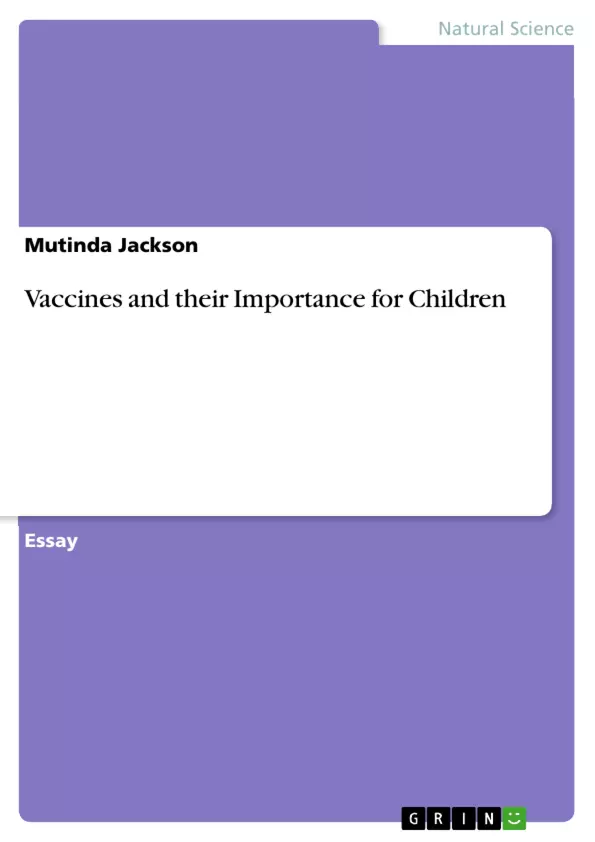In this current era of implausible technology, discovery and medicine, it has adequately been proven that vaccines prevent diseases/infections. Significant medical institutions have for years conclusively supported and even advised the administration of vaccinations to avert infections that at times caused devastating impacts in both the person who contracted and in communities subjected to the disease transmission. Even though a stiff debate on the risks and benefits of vaccination remains evident; with some groups protesting against the constitutionality of vaccine administration, the proponents of this debate have proven that failure to exercising this practice subjects the unvaccinated individual to sickness and even fatality through disease acquisition and transmission. Despite the fact that several novel statistics have demonstrated reduced occurrence of infections with consequences resulting from vaccine-induced passive immunity, fear of risks associated with vaccination still loom. Currently, there are several individuals who are not aware of diseases still occurring in underdeveloped economies due to herd immunity via a majority vaccinated population. However, due to globalization, diseases that may be prevented through vaccination have the potential of landing anywhere.
Inhaltsverzeichnis (Table of Contents)
- Vaccination
- The Potential Benefits of Vaccinations in Children
- Observing the Potential Side Effects of Vaccination to Embrace its Importance
- Conclusion
Zielsetzung und Themenschwerpunkte (Objectives and Key Themes)
This research aims to demonstrate the importance of vaccination for children. The text explores the scientific evidence supporting vaccination, addressing common concerns and misconceptions, and highlighting the benefits of vaccination for both individuals and society.
- The effectiveness and safety of vaccines
- The role of herd immunity in disease eradication
- The potential benefits of vaccinations for children, including disease immunity, health development, and long-lasting lives
- The potential side effects of vaccinations and their relative risk compared to the benefits
- The importance of education and awareness regarding vaccination
Zusammenfassung der Kapitel (Chapter Summaries)
- Vaccination: This chapter introduces the concept of vaccination and its role in stimulating the immune system to develop antibodies against specific diseases. It explores the history of vaccination and addresses the anti-vaccination movement, emphasizing the safety and effectiveness of vaccines.
- The Potential Benefits of Vaccinations in Children: This chapter discusses the various benefits of vaccination for children, including protection from serious diseases like smallpox, polio, and influenza. It explores the concept of herd immunity and its importance in protecting vulnerable individuals. The chapter also highlights the benefits of vaccination for unborn babies through maternal immunity.
- Observing the Potential Side Effects of Vaccination to Embrace its Importance: This chapter examines the potential side effects of vaccination, addressing concerns about autism and Guillain-Barré Syndrome (GBS). It emphasizes that the risks associated with these side effects are extremely low compared to the benefits of vaccination. The chapter also discusses the potential for temporary side effects from vaccines and how they are often mild and short-lived.
Schlüsselwörter (Keywords)
The main keywords and focus topics of this text are: vaccination, herd immunity, disease prevention, childhood diseases, vaccine safety, vaccine efficacy, anti-vaccination movement, autism, Guillain-Barré Syndrome (GBS), public health, and societal benefits.
Frequently Asked Questions
Why are vaccinations important for children?
Vaccinations protect children from devastating diseases like polio, smallpox, and influenza, ensuring healthy development and preventing fatalities.
What is herd immunity?
Herd immunity occurs when a large majority of a population is vaccinated, which stops the transmission of a disease and protects those who cannot be vaccinated.
Are there significant risks associated with vaccines?
While side effects exist, scientific evidence shows they are usually mild and temporary. The risk of serious conditions like GBS is extremely low compared to the dangers of the diseases themselves.
How do vaccines work in the immune system?
Vaccines stimulate the immune system to produce antibodies without causing the disease, allowing the body to recognize and fight future infections effectively.
Can globalization affect disease transmission?
Yes, due to global travel, diseases that are still common in underdeveloped regions can easily land and spread anywhere, making high vaccination rates essential everywhere.
- Citation du texte
- Dr. Mutinda Jackson (Auteur), 2018, Vaccines and their Importance for Children, Munich, GRIN Verlag, https://www.grin.com/document/436824



